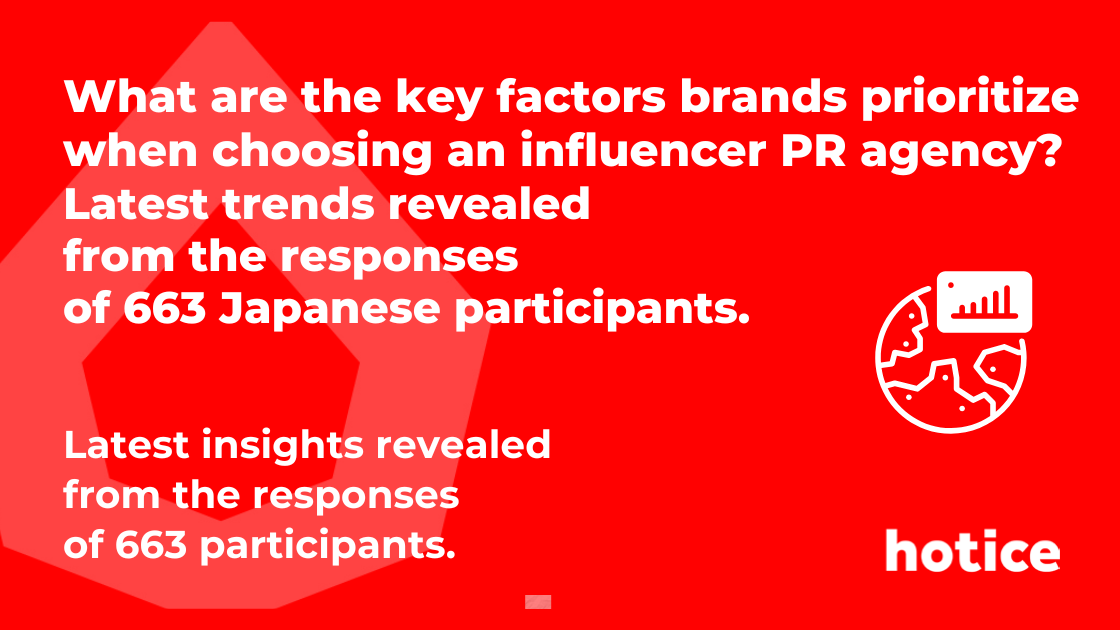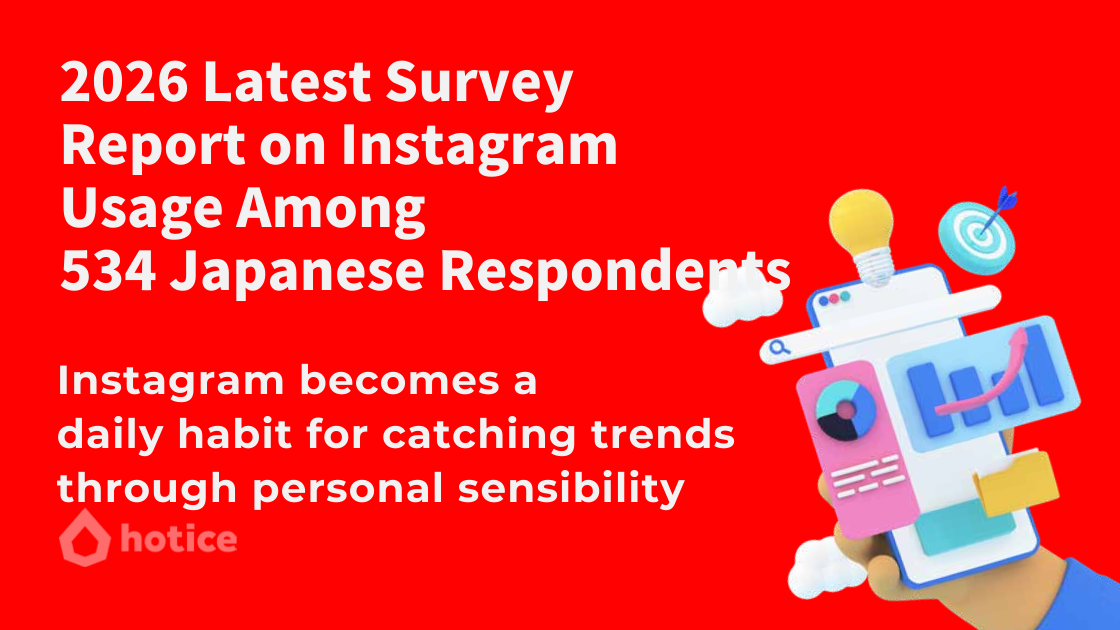What are the key factors brands prioritize when choosing an influencer PR agency? Latest trends revealed from the responses of 663 Japanese participants.

- 1. About 40% Are Open to Using Influencer PR
- 2. Strong Preference Toward Specialized Influencer PR Agencies
- 3. The Most Common Purpose of Influencer PR: Increasing Traffic and Brand Awareness
- 4. Contract Preferences Are Split Among “Per-Project Estimates,” “Performance-Based,” and “Monthly Retainers”
- 5. Most Common Budget Range: ¥100,000–¥500,000
- 6. Sales and Conversions Are the Most Important Metrics for Evaluating Results
- 7. The Most Desired Capability: “Influencer Selection Expertise”
- 8. The Biggest Concern: “Risk of Backlash or Troubles,” Cited by Nearly Half of Respondents
- 9. More Than Half Rated Their Satisfaction as “Somewhat High”
- 10. Strong Demand for First-Time Use, with Over 20% Planning to Continue
- 11. Summary
- 12. For Influencer Marketing in Japan, Trust hotice
To understand how influencer PR is being utilized and what clients expect from agencies, we conducted a nationwide survey targeting both general consumers and corporate representatives.
The survey was carried out online and collected 1,503 valid responses. Respondents included company employees, public sector workers, business owners, self-employed professionals, and freelancers—people who are routinely involved in business activities and familiar with making PR-related decisions.
In this study, we asked respondents about ten key areas: their past experience or willingness to use influencer PR, the criteria they use to select an agency, reasons for outsourcing, how they evaluate results, concerns or challenges, and future intent to use influencer PR.
This article focuses specifically on the 663 respondents who answered that they have used an influencer PR agency before or are considering using one. We analyze their motivations, the factors they prioritize when choosing an agency, and the challenges they perceive.
Through this analysis, we reveal the concrete trends behind how both companies and individuals make decisions when leveraging influencer PR.
About 40% Are Open to Using Influencer PR

When asked about their experience with influencer PR agencies, 17.8% responded that they had used one before, while 54.8% said they had not.
However, 26.3% answered “I haven’t used one, but I would like to,” indicating that a notable portion of respondents are interested even without prior experience.
Only 1.1% said they had directly commissioned an influencer without going through an agency.
This refers to cases where companies contact influencers on their own, but the low percentage suggests that this approach is not common due to risks related to contract management and project coordination.
Overall, many respondents show interest in influencer PR but have not yet taken the step toward outsourcing.
Concerns such as unclear pricing, fear of potential backlash, and a lack of understanding about the process likely contribute to the low number of experienced users.
From a practical standpoint, the segment of users who “have no experience but are interested” represents an important target for future growth.
If the workflow and cost structure are clearly explained, this group is highly likely to proceed with outsourcing, making them a key driver in market expansion.
Additionally, the fact that fewer than 20% have prior experience suggests that many companies have yet to establish clear success patterns or evaluation criteria.
This highlights the growing expectation for agencies not only to execute campaigns but also to support companies undertaking influencer PR for the first time.
Strong Preference Toward Specialized Influencer PR Agencies

When asked what type of agency they would choose when considering or outsourcing influencer PR, the most selected option was “specialized influencer marketing agencies” at 46.8%.
This was followed by PR/public relations agencies (39.8%) and production companies (video production, SNS management, etc.) at 39.2%, indicating a clear preference for companies with strong expertise in specific areas.
Meanwhile, traditional advertising agencies (general or digital) were chosen by 38.8%, a similar level to specialized firms. This suggests that some users strategically differentiate between niche-specialized agencies and generalist agencies depending on their needs.
Additionally, marketing support firms accounted for 30.2%, showing that a notable segment seeks assistance in areas such as strategy development and overall optimization.
Only 4.4% responded that they “do not use or do not plan to use any agency,” indicating that most respondents are considering some form of external partner.
Overall, the data suggests that clients prioritize a balance of expertise and execution capability, selecting agencies based on the specific objectives of their influencer PR initiatives.
The Most Common Purpose of Influencer PR: Increasing Traffic and Brand Awareness

The top reason respondents wanted to outsource influencer PR to an agency was “the ability to coordinate multiple influencers at once,” selected by 47.36%.
This was followed by “secure management of contracts and rights” (46.00%) and “support for handling risks such as backlash or other issues” (36.50%), revealing a strong desire to reduce operational burdens and mitigate risks.
Other frequently selected reasons included “delegating performance measurement and reporting” (34.24%) and “seeking professional insights and strategic proposals” (30.17%). These responses highlight the growing demand for expertise and data-driven execution.
Ultimately, all these motivations point toward a single underlying goal: efficiently maximizing customer acquisition and brand awareness.
Many clients feel that outsourcing the more complex aspects of influencer management to specialists is the most reliable way to ensure quality and safety in their campaigns.
Consequently, when selecting an agency, respondents value not only influencer sourcing but also comprehensive capabilities such as risk management, reporting, and strategic guidance.
Contract Preferences Are Split Among “Per-Project Estimates,” “Performance-Based,” and “Monthly Retainers”

When respondents were asked about their preferred contract and pricing model, the most selected option was “per-project estimate” at 31.7%.
Given that the scope and workload vary significantly by campaign, this suggests that many companies value the flexibility to request services on a case-by-case basis.
This was followed closely by “performance-based compensation” (29.6%) and “monthly retainer fees” (26.9%), showing that both predictable monthly costs and results-driven payment models have strong demand.
The choice appears to depend largely on each client’s objectives and risk tolerance.
Meanwhile, only 6.8% selected “hybrid models”, indicating that more complex pricing structures are less preferred, and that simplicity and clarity are valued.
Additionally, 5.1% responded with “undecided,” suggesting that some companies are still unsure which model best fits their needs.
The fact that preferences are distributed relatively evenly across several contract types is particularly notable.
For agencies, this indicates the importance of offering flexible plans—whether one-off projects, ongoing management, or performance-linked options—to accommodate a wide range of client expectations.
Most Common Budget Range: ¥100,000–¥500,000

When respondents were asked about their budget for influencer PR initiatives, the most selected range was ¥100,000–¥500,000, accounting for 30.9% of all answers.
This price range is likely favored because it is realistic for a single campaign while still allowing for a reasonable level of quality.
This was followed by “under ¥100,000” (23.5%) and “¥500,000–¥1,000,000” (23.2%), showing a polarization between low-budget and mid-range spending.
The results suggest a mix of companies that want to start small and test the waters, and those willing to invest more to pursue stronger outcomes.
Higher budgets were less common, with “¥1,000,000–¥3,000,000” at 10.6% and “over ¥3,000,000” at only 1.4%.
This indicates that fully treating influencer PR as a major marketing investment is still relatively rare, with many companies preferring to operate within a manageable, lower-risk range.
Additionally, 10.4% responded with “undecided”, suggesting that some companies either lack a clear understanding of typical market rates or have yet to define their specific campaign plans.
Overall, many clients appear to choose budget ranges that minimize risk while allowing them to proceed.
For agencies, offering flexible pricing structures and easy-to-start plans will likely be essential to meet the needs of this market.
Sales and Conversions Are the Most Important Metrics for Evaluating Results

When respondents were asked how they evaluate an agency’s performance, the top answer was “sales or conversions,” selected by 42.2%.
Even for PR-focused initiatives, many companies ultimately judge success based on how much the campaign contributes to business outcomes.
The second-highest metric was “buzz or virality” (25.8%), indicating that companies still expect influencer PR to generate social media-driven attention and widespread reach.
Short-term visibility remains a meaningful evaluation point for many.
“Increase in social media followers” (22.3%) also ranked notably, showing that a significant group values community building and sustained audience engagement as part of campaign success.
In contrast, “website traffic or on-site engagement” (5.7%) and “brand awareness improvement” (3.9%) were much lower.
This suggests that companies tend to prioritize short-term, quantifiable indicators over indirect or long-term metrics.
Overall, companies show a strong preference for metrics that clearly reflect direct contribution to business performance.
As a result, agencies are increasingly expected to provide transparent reporting and measurable outcomes.
This also highlights the importance of designing campaigns from the planning stage with sales and conversions in mind, rather than treating them as secondary results.
The Most Desired Capability: “Influencer Selection Expertise”

When respondents were asked which role they expect most from an agency, the top answer was “influencer selection expertise,” chosen by 40.6%.
This highlights how crucial the “who to collaborate with” decision is, and how many companies want specialists to handle this judgment, as it strongly influences campaign outcomes.
The second-highest expectation was “planning and proposal capabilities” (35.4%), showing that companies place significant value on strategic design and the quality of creative ideas.
Clients are not simply looking for influencer assignments—they want agencies to build strategies aligned with their goals.
In contrast, “KPI design and analytics” (10.6%), “risk management for potential backlash” (8.1%), and “cost optimization” (5.3%) ranked relatively low.
This suggests that clients prioritize the early stages of the process—casting and planning—over operational or risk-related tasks.
Overall, clients strongly expect agencies to deliver accurate influencer selection and impactful campaign planning, with these two factors far outweighing other roles.
In other words, the precision of casting and the strength of strategic development have become the primary decision-making criteria when choosing an influencer PR agency.
The Biggest Concern: “Risk of Backlash or Troubles,” Cited by Nearly Half of Respondents

When asked about their concerns regarding the use of agencies, the most common response was “fear of backlash or unexpected troubles,” selected by 50.2%.
Many companies remain highly sensitive to the unique risks of social media, and worry about unforeseen incidents when working with influencers.
The second most common concern was “proposals may not align with our expectations” (41.9%).
This suggests that some companies have experienced mismatches in direction or expectations, leading to campaigns that fail to produce the desired results.
“Difficulty measuring results” (36.1%) and “unclear return on investment” (31.8%) were also among the top concerns, indicating a broader challenge around the “lack of visibility” in PR activities.
The difficulty of quantifying indirect impact or tracking the full scope of campaign effects appears to create hesitation among potential clients.
In contrast, “difficulty getting internal approval” (25.9%) ranked relatively low, suggesting that internal processes are less of a barrier compared to concerns around transparency and campaign quality.
Only 5.3% responded with “no particular concerns,” showing that the vast majority hold some form of apprehension.
Overall, companies are primarily seeking risk reduction and clear, measurable results.
This highlights the need for agencies not only to strengthen governance and provide crisis-prevention measures, but also to offer transparent reporting, clear explanations of campaign rationale, and communication that reinforces client confidence.
More Than Half Rated Their Satisfaction as “Somewhat High”

When respondents were asked about their satisfaction (or expectations) toward agencies, the most common answer was “somewhat high,” selected by 51.6%.
This indicates that more than half of clients feel generally positive, acknowledging a certain level of results and support without major dissatisfaction.
The next largest group was “neither satisfied nor dissatisfied” (31.7%), representing a neutral stance.
This suggests that for many, satisfaction depends on factors such as campaign content, execution quality, and compatibility with the assigned representatives.
Meanwhile, “very high satisfaction” was chosen by 14.3%, indicating that only a portion of clients feel exceptionally satisfied.
However, it is noteworthy that negative responses—“somewhat low” (1.5%) and “low” (0.9%)—were extremely rare.
Overall, there appears to be little significant dissatisfaction or distrust toward agencies.
In summary, clients generally perceive agencies as providing a baseline level of quality and reliability, while still expecting further improvement and stronger proposals.
Although dissatisfaction is minimal, the potential to achieve outstanding, exceptionally high satisfaction remains an area of opportunity.
Strong Demand for First-Time Use, with Over 20% Planning to Continue

When respondents were asked about their future use of influencer PR agencies, the most common answer was “I want to try using one for the first time,” selected by 45.4%.
This shows that a large portion of respondents—despite having no prior experience—are highly interested and view influencer PR as a strategic next step.
The second most common response was “I want to continue or expand usage” (23.8%).
These respondents have already worked with agencies and appear satisfied enough with the results or workflow to consider further investment.
On the other hand, 18.3% answered “I want to consider switching to another agency,” indicating that some users see room for improvement in areas such as planning quality, communication, or pricing.
Only 2.9% selected “I want to switch to direct influencer contracts,” making this a clear minority.
Given the workload and risk management required when dealing directly with influencers, the benefits of using an agency remain compelling for most.
9.7% responded “undecided,” suggesting that while interest exists, some respondents lack a concrete understanding of how influencer PR works.
With clearer information and guidance, their intent to use an agency could increase.
Overall, the intention to use agencies is not declining—if anything, the potential for new users is growing significantly.
This indicates that the market is poised for further expansion, and agencies have a strong opportunity to grow by enhancing proposals and onboarding support for first-time clients.
Summary
Based on insights from 663 respondents, it is clear that specialized expertise, risk management, and clear performance visibility are the most important factors when choosing an influencer PR agency.
The main reasons for outsourcing are efficient coordination of multiple influencers and secure contract management, while the most expected capabilities are accurate influencer selection and strong strategic planning.
At the same time, the top concern is the risk of backlash or unexpected troubles, and companies tend to prioritize sales and conversions as key performance indicators.
Looking ahead, the largest segment consists of those who want to request an agency for the first time, suggesting strong potential for continued market expansion.
For Influencer Marketing in Japan, Trust hotice
At hotice, we specialize in influencer marketing with a strong focus on Asia, and particularly Japan. Our multinational team offers end-to-end support, from matching the right influencers for your industry and goals, to campaign planning and performance tracking. With extensive experience working with leading companies, we ensure safe and effective promotions grounded in cultural awareness and compliance with local regulations.
If you are considering a strategic influencer campaign tailored to the Japanese market, we invite you to partner with hotice to achieve meaningful results.
.png)






